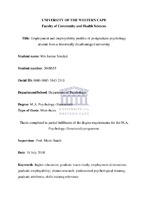Employment and employability profiles of postgraduate psychology alumni from a historically disadvantaged university
Abstract
The present study aimed to determine the employment and employability profiles of alumni
from structured professional Masters programmes in psychology. Issues of low enrolment
rates and high attrition rates are at the fore of transformation efforts in the South African
higher education sector. The concern of graduate employability and the relevance of skills
training received to the labour market are of international concern. Graduate tracer studies
have been successfully implemented internationally to attempt to understand these issues.
Training relevance is of particular concern for the field of psychology in South Africa, as
there is a significant shortage of mental health professionals. Understanding where graduates
from professional Masters degrees in psychology find employment, as well as understanding
their employability, may lead to greater absorption of graduates from these programmes into
the workforce. Permission to conduct the present study and ethics clearance was obtained
from the Senate Research Committee of the University of the Western Cape, and all relevant
ethics principles were adhered to. An incentivised, online survey was conducted with a
sample of 29 Masters-level graduates from two professional psychology programmes at a
historically disadvantaged university. The study used a modified version of the Standard
Instrument for Graduates. The survey had a 50% response rate (29 of 58) after at least four
electronic reminders. Respondents graduated between 2008 and 2013, 13 from the clinical
Masters programme and 16 from the research Masters programme. Descriptive statistics were
used to depict the employment and employability profiles of the alumni. Most of the
respondents were female (n=21), and about a third were first generation students (n=11).
Most of the respondents were currently employed (n=25). They were employed in a variety
of fields, predominantly health (n=10) and higher education (n=7), and largely clustered in
the public sector (n=17). This suggested a transferability of skills. The training received was
perceived to be relevant, in terms of accessing employment and conducting current work.
Most of the clinical graduates were registered as clinical psychologists (n=12) with the
Health Professionals Council of South Africa. There were varied registrations held by
graduates from the research programme and some were not registered. The respondents held
generally positive attitudes towards their alma mater. These descriptive results were
interpreted through the use of McQuaid and Lindsay's (2005) framework of employability,
based on the interaction between their individual factors, personal circumstances and external
factors. Through this frame, the results highlighted the complex nature of the employability
of these graduates.

